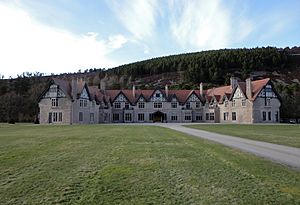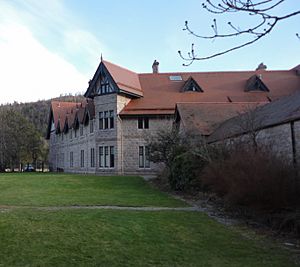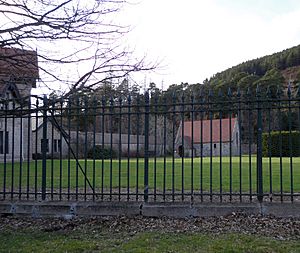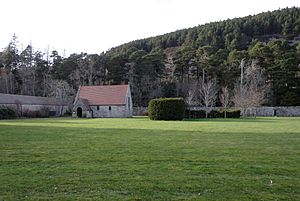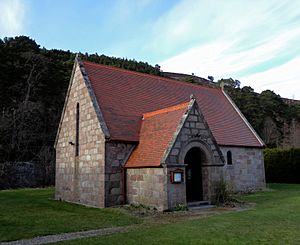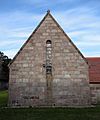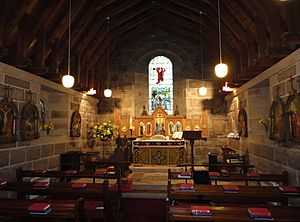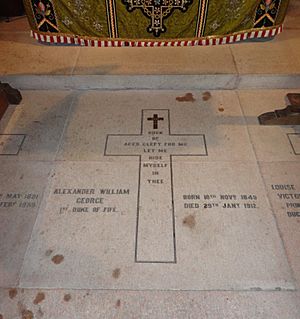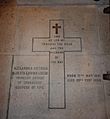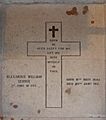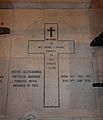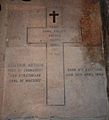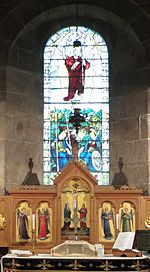St Ninian's Chapel, Braemar facts for kids
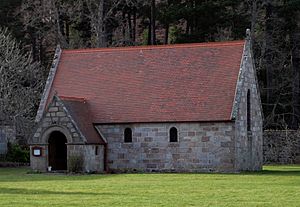
St Ninian's Chapel is a special church building located in Braemar, Aberdeenshire, Scotland. It's part of the beautiful Mar Lodge Estate and is a Grade B listed building, which means it's an important historical place. This chapel belongs to the Scottish Episcopal Church, which is a branch of the Anglican Church in Scotland. It was built between 1895 and 1898 for the family of Alexander Duff, 1st Duke of Fife, who owned Mar Lodge. Since 1899, it has been owned by the Diocese of Aberdeen and Orkney in the Scottish Episcopal Church. St Ninian's Chapel is the most western church in this Diocese.
Contents
History of St Ninian's Chapel
St Ninian's Chapel has always been closely connected to Mar Lodge and the families who owned it.
Building the Chapel and Its Owners
St Ninian's Chapel was built at the same time as the main house, Mar Lodge. The first stone for Mar Lodge was laid by Queen Victoria on October 15, 1895! Both the lodge and the chapel were finished in 1898. The architect for both buildings was Alexander Marshall Mackenzie. Queen Victoria liked his design for another church, so she suggested him to her grandson-in-law, Alexander Duff, 1st Duke of Fife.
Building Mar Lodge and the chapel was a big project. The chapel itself cost much less than the main lodge. Soon after it was finished, in January 1899, the Duke of Fife gave the chapel to the Diocese of Aberdeen and Orkney. This means it became the property of the Scottish Episcopal Church, and it has been ever since.
The Chapel's Use by the Royal Family
Many important guests, including members of the Royal Family, visited Mar Lodge. The Duke of Fife would host events for his guests and staff. It's believed that St Ninian's Chapel was regularly used by the Duke's family and their visitors for church services.
The 1st Duke of Fife passed away in 1912. His eldest daughter, Princess Alexandra, 2nd Duchess of Fife, then managed the Mar Estate. The chapel continued to be used as a private chapel by the family until 1959. We don't have many records of the services held during that time.
When the 2nd Duchess of Fife passed away in 1959, a large part of the Mar Estate had to be sold because of high taxes. The estate was divided. Eventually, the National Trust for Scotland bought the Mar Lodge Estate in 1995, and they still own it today.
Description of St Ninian's Chapel
Chapel Location
St Ninian's Chapel is located within the beautiful grounds of the Mar Lodge Estate. The chapel and the lodge are in a quiet, countryside area, near a road that runs through the valley. The chapel is built close to the main Mar Lodge complex, inside a large walled garden area.
Chapel Exterior
St Ninian's Chapel is a small, rectangular building. It has a porch on its south side. It was built using large, red granite blocks, which gives it a strong, traditional look. The stone came from local quarries. The roof is covered with small red tiles.
The north side of the chapel has three small, round-arched windows with stained glass. The west end has one pointed-arch window with stained glass. The east end has a single, large round-arch window, also with stained glass, and a cross on top of the roof.
On the south side, there are two small, round-arched windows with stained glass. The main entrance porch is on this side. It has a round-arched doorway with a wooden door and decorative metal hinges. There's also a small cross on top of the porch roof.
Chapel Interior
The inside of St Ninian's Chapel is small and cozy, with seating for about 40 people. You can see the wooden roof structure, called a hammerbeam roof, from inside. There are simple wooden benches, called pews, divided by a central walkway.
The chancel, which is the area near the altar, is a bit higher than the main seating area. It has a stone floor, and underneath it is a burial vault. The chancel has a small altar with a cover, and a rail in front of it. There's also a wooden prayer stall and a reading desk. On the wall behind the altar, there's a beautiful decorated screen called a reredos. It has painted pictures of angels and the Crucifixion. A crucifix on the reredos was a gift from Alexandra Princess of Wales in 1890.
Special Features of the Chapel
Burials in the Chapel
In front of the altar, there is a burial vault covered by five stone slabs. This vault is made of polished red granite. Before it was sealed up after the burial of the 1st Duke of Fife, the estate workers and their families were invited to see it. Four people are buried here:
- Princess Alexandra, 2nd Duchess of Fife (1891–1959): She was the daughter of the 1st Duke of Fife and the wife of Prince Arthur of Connaught. Her ashes were placed in the chapel.
- The 1st Duke of Fife (1849–1912): He was first buried in St George's Chapel, Windsor Castle, but his remains were later moved to St Ninian's Chapel in August 1912.
- The Princess Royal, Duchess of Fife (1867–1931): She was the wife of the 1st Duke of Fife. Her remains were also moved to St Ninian's Chapel from Windsor Castle.
- The 2nd Duke of Connaught and Strathearn, Earl of Macduff (1914–1943): He was the son of the 2nd Duchess of Fife. His ashes were placed in the chapel.
-
Grave of the 2nd Duchess of Fife, daughter of the 1st Duke
-
Grave of The 1st Duke of Fife
-
Grave of the Princess Royal, wife of the 1st Duke of Fife
-
Grave of The 2nd Duke of Connaught and Strathearn, Earl of MacDuff, son of the 2nd Duchess of Fife
Memorials in the Chapel
There are eight special plaques or stones set into the walls of the chapel. These are dedicated to the memory of different people:
- The Duke of Clarence (died 1892)
- King Edward VII (died 1910)
- Queen Alexandra (died 1925)
- Major General Prince Arthur of Connaught (1883–1938)
- The 2nd Duke of Connaught and Strathearn, Earl of Macduff (1914–1943) – he has both a wall plaque and a floor slab.
- Maud Carnegie, Countess of Southesk (1893–1945)
- Charles H. Taylor, who was the Secretary to the Duke and Princess Royal.
- Ada Ellen Roberts (1876–1943).
-
Wall-mounted plaque for The Duke of Clarence
-
Wall-mounted plaque for King Edward VII
-
Wall-mounted plaque for Queen Alexandra
-
Wall-mounted plaque for Major General Prince Arthur of Connaught
-
Inscribed stone for Princess Maud, Countess of Southesk
Stained Glass Windows
St Ninian's Chapel has beautiful stained-glass windows made by a famous company called Charles Eamer Kempe & Co Ltd. The artist for these windows was John William Lisle.
- The east window, behind the altar, shows the Resurrection.
- The west window shows St Michael fighting a dragon, with a small scene of the crucifixion below.
- The other smaller windows (three on the north side and two on the south side) show angels playing musical instruments.
Some of the windows have a special mark from Kempe's studio: a wheatsheaf with a tower on it.
Stations of the Cross
Inside the chapel, there are fourteen painted pictures called Stations of the Cross. These pictures show different moments from the last day of Jesus's life.
Organ
St Ninian's Chapel does not have a large pipe organ. Instead, it has a small musical instrument called a harmonium.
See also
- Places, place names, and structures on Mar Lodge Estate
 | Selma Burke |
 | Pauline Powell Burns |
 | Frederick J. Brown |
 | Robert Blackburn |


